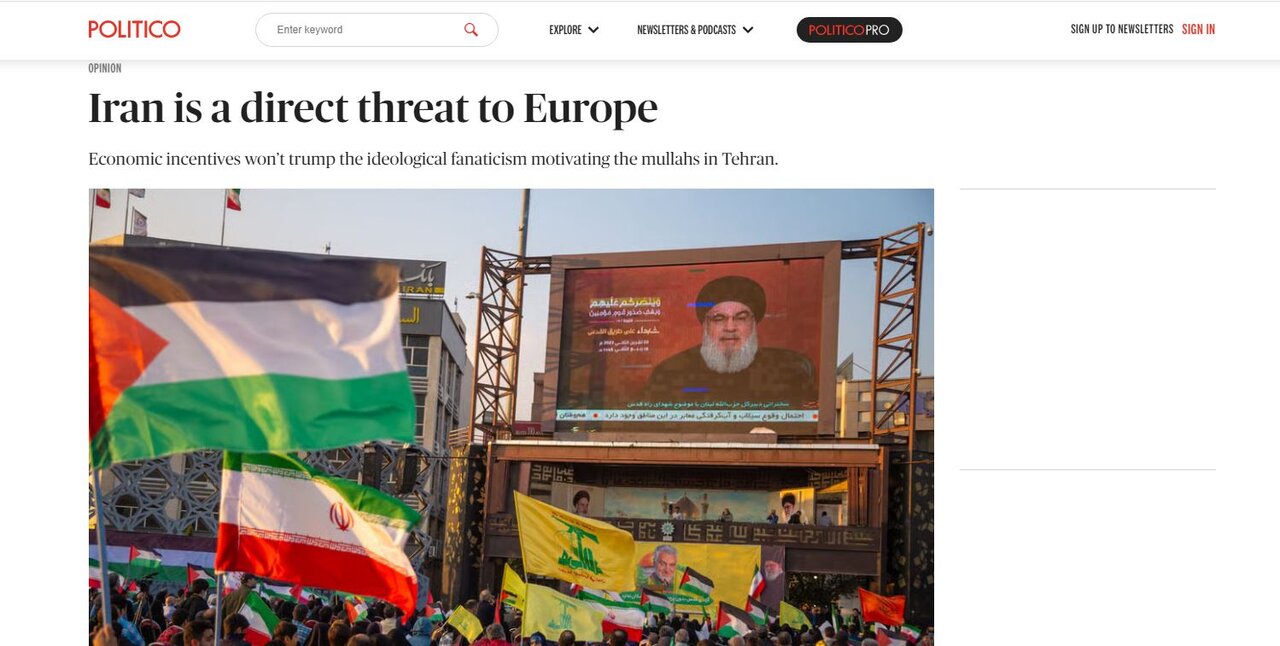Israel is a global threat, blaming Iran is a fallacy

TEHRAN - The American publication Politico ran a story on November 13 that aimed to portray Iran as a global threat. Yet, Tel Aviv is the source of regional and international turmoils.
The article, titled "Iran is a direct threat to Europe," attempts to depict Iran as a global menace, blaming the crisis in the region and rising fuel prices on Iran.
Written by Henrik F. Rasmussen, the article claims that Iran's military power and its nuclear program pose a threat to Europe and the U.S.
Rasmussen, following Israeli propaganda, calls for Europe and the U.S. to exert maximum pressure on Iran.
The article also urges the parties to the JCPOA- France, Germany, and the United Kingdom - to “trigger a snapback,” restoring the pre-JCOPA UN sanctions against Iran.
The Joint Comprehensive Plan of Action, commonly known as the Iran nuclear deal or Iran deal, is an agreement on the Iranian nuclear program reached in Vienna on 14 July 2015, between Iran and the P5+1.
Nevertheless, Politico's argument will be countered with five key points:
First, the article's reliance on Israeli officials' propaganda to portray Iran as a global threat is seen as an attempt to unite European countries and the U.S. to counter Iran and apply harsh measures against Tehran.
Earlier in June 2023, Israeli Minister Benny Gantz, spoke to attendees of The Jerusalem Post Conference gala on matters of Israel's current political state, and “Iran's threat on a global level.” He portrayed Iran as a global threat.
Second, Iran has never posed a threat to Europe. Tehran has never had an agenda in its foreign policy to threaten European countries.
Europe has applied some wrong policies in West Asia, but Tehran has considered those policies as solvable through dialogue and diplomatic engagement.
Third, Israel is the main cause of the current turmoil in West Asia due to its oppression of Palestinians over the last 70 years. So, the blame for the rising fuel prices is shifted towards Israel rather than Iran.
Israeli oppression and its desecration of Islamic sanctities were the incentives for Hamas to launch the retaliatory Operation al-Aqsa Storm. So, Rasmussen cannot shift the blame on Hamas or Iran as the cause of the ongoing crisis.
Although Tel-Aviv has caused the hike in fuel prices, the shaky regime of Tel Aviv is trying to project its mistakes on Iran.
Fourth, Iran does not possess nuclear weapons and has never threatened any country with nuclear weapons. Additionally, Iran has been subject to the most rigorous inspection regime by the UN nuclear watchdog.
Tehran cannot be a threat to Europe since Iran does not have shared borders with European countries. But the Tel Aviv regime, which is closer to Europe, has a nuclear arsenal that is not monitored by the IAEA.
Israel has a nuclear arsenal and far-right Israeli officials have openly discussed using atomic bombs against the Gaza Strip.
In early November, Israel's Heritage Minister Amichai Eliyahu considered dropping an atomic bomb in the enclave “an option.”
The occupying regime’s nuclear arsenal is not subject to any monitoring by the International Atomic Energy Agency.
Fifth, the article's claim about Iran's military support for Russia in the Ukraine-Russia war is also refuted, as Iran has invited both Moscow and Kyiv to seek political solutions.
In conclusion, the Politico article's attempt to depict Iran as a global threat is refuted with evidence that points to Israel's own actions.
Leave a Comment